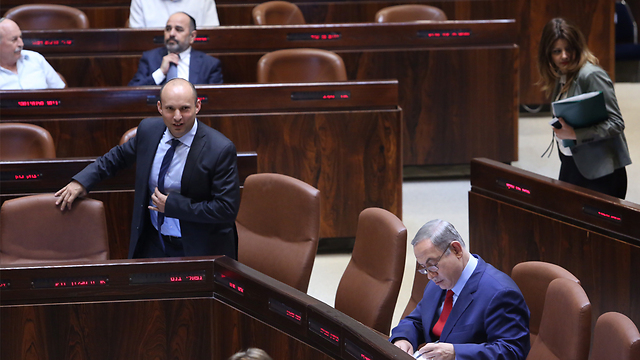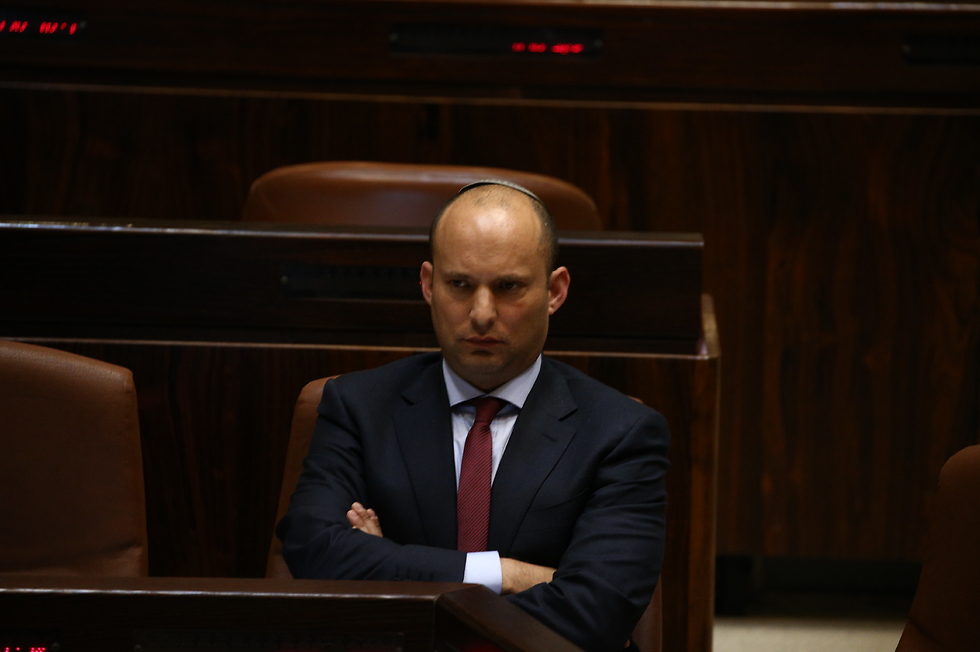
Bennett. Sees the 'regulation basket' as a victory
צילום: רויטרס
Bennett’s euphoric week
Analysis: As far as the Bayit Yehudi leader is concerned, passing the Regulation Bill in first reading and the legal opinion provided by the attorney general are the first step towards applying Israeli sovereignty to the entire Jewish settlement in Area C.
Former Minister Shalom Simhon celebrated his 60th birthday last Tuesday. The guests included a number of friends from the Labor Party. Simhon shared a table with former Prime Minister and Defense Minister Ehud Barak and MK Shelly Yachimovich, while Opposition Chairman Isaac Herzog and Finance Minister Moshe Kahlon sat around another table.
When Barak was about to leave, Kahlon turned to him with his famous cattish smile, a combination of naivety and slyness, and said: "Ehud, what’s up? When will Bibi be toppled?"
Barak, who has been criticizing Prime Minister Benjamin Netanyahu from every possible stage recently, smiled.
"For now, we’ve toppled the statue," he said.
But who had the last laugh, or smile? The No. 1 threat on the government’s existence was removed by the coalition last week in a first reading. There were quite a few politicians who said that Amona would dissolve the government. That will likely not happen. There will be unpleasant sights, as we already started seeing at the Ofra settlement’s secretariat when Amona residents confronted Yesha Council officials.
But Amona’s fate has been sealed. The ball is now in Amona’s court. Or as a right-wing political source said last week: With all due respect to 40 families, they won’t drive the country crazy. Whether they want to climb the hill, build a new community in Shvut Rachel, or move one kilometer to Ofra – it’s up to them. But it’s over. Amona will be evacuated. It will be moved somewhere between 50 meters to one kilometer away. It’s not good, but it’s not the end of the world.
Indeed, settler leaders celebrated last week. First of all, for passing the first reading of the Regulation Bill. But they had another reason to rejoice. On Wednesday, Attorney General Avichai Mandelblit issued a legal opinion promising that even if the High Court invalidates the Regulation Bill, this opinion, which is based on the “market ouvert,” could serve as a strategic solution for the Judea and Samaria settlers.
The market ouvert says that if someone built their home in good faith on land owned by someone else, their house will not be demolished but they will be required to pay pecuniary compensation. Education Minister Naftali Bennett says that’s what happened to his father, who was the sole owner of a plot near the Technion in Haifa. A neighbor accidently built on part of his father’s property and compensated the father, but his home was not demolished.
Bennett sees this opinion, which he calls “the regulation basket,” as a victory as big as the first reading of the Regulation Bill. While this regulation basket is implemented not through legislation, he explains to his interlocutors, it is as important as the bill and maybe even more. It is slightly narrower than the bill, because it does not cover all cases. It’s less comprehensive, but much more certain.
This is the solution he wanted, he tells his interlocutors, because he understands that the Regulation Bill is not unbreakable, as it can be invalidated by the High Court. The attorney general’s opinion, he says, is already changing the residents’ lives as we speak. They can already add to their homes.
There is no wonder, therefore, that Bennett was in a state of euphoria last week. As far as he is concerned, these two things – passing the bill in first reading and Mandelblit’s opinion – are the first steps towards applying Israeli sovereignty to Ma’ale Adumim, the Jordan Valley, Ofra – the entire Jewish settlement in Area C.
High Court petitions are no more, Bennett told his friends last week. What's left is the Amona evacuation, nine homes in Ofra, and Netiv Ha’avot – and there is nothing that can be done about them. Those are peremptory rulings. But that’s it. Those are the death throes of the previous era. We have now entered a new era. And it happened at 4pm Wednesday, when he applied to Judea and Samaria something that exists in Israeli laws. And that’s what he has been trying to do for an entire year. The Regulation Bill, as leverage, made it possible. Suddenly, like a domino effect, everything happened. Row after row of dominoes fell down.
But Bennett sees this not just as an ideological victory, but also as a great political victory. It’s perfectly clear to him that the law – and, to the same extent, the regulation basket – will be named after him. After all, Netanyahu did everything in his power to avoid reaching this moment. He left no stone unturned. On Wednesday, he had the flu again. Ministers say he looked worn out. He practically fell asleep during meetings. One thing’s for sure: This law is affecting his health. It’s not easy for him to see Bennett navigating this entire thing.
To know what Netanyahu really thinks about this law, look no further than 2012, when the Regulation Bill was rejected by a majority of 69 lawmakers versus 20. It’s the same law. At the time, Netanyahu voted against it and explained why the law was bad.
So what has changed since then? The answer is Bennett.
In the past two weeks, the Bayit Yehudi leader spent 30 hours in face-to-face meetings with the prime minister. It began with complete distrust and eventually turned into a united front. That’s why Bennett is supporting Netanyahu rather than attacking him. On Wednesday, for the first time since the elections and certainly the first time in a very long time, Netanyahu sat down next to Bennett at the Knesset plenum and shook his hand.
My advice to Bennett is not be too impressed by these gestures. He should wait another day or two for the prime minister’s next Facebook post, when he tells the people of Israel how he made history. How he, Netanyahu, passed the Regulation Bill. How he kept his promise to annex Judea and Samaria.
In the meantime, he has the Muezzin Bill. The bill that, apart from the prime minister, not a single government minister sees as necessary. It’s a law that already exists, and it was only born following the progress made on the Regulation Bill. And it really doesn’t matter who came up with this unnecessary and damaging law, Netanyahu the father or Netanyahu the son. Netanyahu clearly realized that Bennett was gaining strength in the right-wing camp and decided that he must respond.
What's happening now happens often – the dynamic of a foolish law. A version of bill was supposed to be discussed at the Knesset on Wednesday. This version, which received the ultra-Orthodox's blessing, determines that the ban on loudspeaker systems in mosques would only be applied at night. But at the last moment, although he had been okay with it, Netanyahu announced that he was backtracking on the agreements and demanding more significant restrictions on the loudspeaker systems. In other words, that the law would apply to daytime hours too.
What happened between the compromise and his decision to backtrack from it?
Well, we already know the answer: Bennett.













